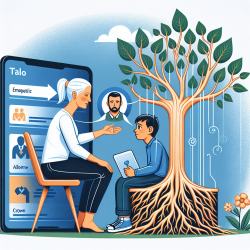In the ever-evolving field of online therapy, staying informed about the latest research and resources is crucial for delivering effective and innovative services. One such resource that has the potential to enhance your practice is the Tallo database, a comprehensive collection of tree allometry and crown architecture data. While this might seem unrelated at first glance, the insights from this database can be applied to various aspects of therapy, particularly in special education settings.
Understanding the Tallo Database
The Tallo database, as presented in the research article titled "Tallo: A global tree allometry and crown architecture database," is a remarkable compilation of data capturing multiple axes of tree size and shape. It includes measurements of stem diameter, height, and crown radius for nearly half a million trees from over 61,000 sites globally. This extensive dataset spans all major forested and non-forested biomes and represents over 5,000 species. The database is publicly archived and accessible, making it a valuable resource for researchers and practitioners alike.
How Tallo Database Insights Can Enhance Online Therapy
1. Data-Driven Decision Making
In special education, data-driven decision-making is paramount. The Tallo database provides a robust example of how large datasets can be used to inform practices. By understanding how researchers utilize tree measurements to draw conclusions about forest dynamics, online therapy practitioners can appreciate the importance of collecting and analyzing data in their own practice. This can lead to more informed decisions about interventions and strategies.
2. Environmental Context in Therapy
The detailed environmental data in the Tallo database highlights the significance of context. Just as tree growth and architecture are influenced by their environment, students' learning and development are affected by their surroundings. Online therapy practitioners can use this analogy to emphasize the importance of creating a supportive and adaptive virtual learning environment for students.
3. Individualized Approach
The Tallo database includes data for a wide variety of tree species, each with unique characteristics. This diversity underscores the importance of an individualized approach in therapy. Practitioners can draw parallels to their work, recognizing that each student has distinct needs and strengths. Tailoring interventions to fit these individual profiles can lead to more effective outcomes.
4. Interdisciplinary Collaboration
The Tallo database is a product of collaboration among numerous researchers from different fields and regions. This collaborative effort can inspire online therapy practitioners to seek interdisciplinary partnerships. Working with educators, parents, and other professionals can enrich the therapy process and provide a more holistic approach to supporting students.
Encouraging Further Research
The Tallo database not only serves as a resource for immediate application but also encourages further research. Online therapy practitioners can explore how similar large-scale data collection and analysis methods can be applied to their field. For instance, developing a comprehensive database of student progress and therapy outcomes could revolutionize how interventions are designed and implemented.
Practical Steps for Implementing Tallo Insights
To integrate the insights from the Tallo database into your online therapy practice, consider the following steps:
- Review the Database: Familiarize yourself with the Tallo database and its methodology. Understanding how the data was collected and analyzed can provide a framework for your own data collection practices.
- Adapt Data Collection Methods: Implement similar data collection techniques in your practice. This could involve regular assessments and tracking of student progress to identify patterns and inform interventions.
- Create Supportive Environments: Just as trees thrive in optimal environments, students benefit from supportive virtual learning spaces. Ensure that your online therapy sessions are engaging, interactive, and adaptable to each student's needs.
- Emphasize Individualization: Recognize and celebrate the unique characteristics of each student. Tailor your interventions to align with their specific strengths and challenges, much like how different tree species require different care.
- Foster Collaboration: Engage with other professionals and stakeholders in your students' education. Collaborative efforts can provide a more comprehensive support system and enhance the effectiveness of your interventions.
Conclusion
The Tallo database offers a wealth of information that, when applied creatively, can enhance the practice of online therapy, especially in special education. By embracing data-driven decision-making, considering environmental contexts, individualizing approaches, and fostering collaboration, practitioners can improve their services and outcomes for students.
To read the original research paper, please follow this link: Tallo: A global tree allometry and crown architecture database.










